Min(ni)e de Rien – Nice ‘bye ‘bye
It really didn’t seem possible at the time – a cause already lost, not to be contemplated. I hardly dared hope that this notion might be proved wrong. But it turned out to be true all the same. France successfully performed almost exactly the same alchemy upon me as it did many years ago, when I bounced off to Paris in pursuit of career and independence, thrumming with all the energy, aspirations – and expectations – of the young.
But there you are: this time around, much older, I’ve found myself being treated with much of the same respect as before. And that certainly could not have been predicted.
Now that I’m leaving, I can luxuriantly compute all the many and varied components that add up to this effect. They include the lovely elderly organic market gardener who sells her delicious produce at the Cours on Saturdays. She greets me with a beaming smile before slipping the odd tomato, an extra salad pepper (those crisp, elongated ones – a local specialty) into my plateau and giving me a discount on the lot. The other greengrocer lady, who always stuffs in a bunch of parsley – with a wink and a refusal to charge. The very different, magnificently dignified poultry lady from the arrière-pays, whose eggs are the best I’ve ever tasted, and who when I turned up too late one Saturday morning rummaged through her baggage and emerged triumphant with one, large remaining egg which she proceeded to wrap and hand to me. Again, no charge.
They include the handsome newsagent and his growing family (news of the baby is related once we’ve exchanged greetings over a handshake). The verger at the Cathedral and his wife (‘The Keeper of the Shrine’) who mark my appearance with confidences (‘arthritis – a curse!’ ‘Work – hard, but a blessing …’) and kisses.
Then there is the nice doctor, who gave me a free consultation when times were hard – even though I had neither asked nor expected him to do so. There are the many unexpectedly relaxed, helpful and efficient public servants and private sector managers I have had dealings with since I came here. One or two have even bent the odd rule in order to accommodate me, recognising me for the ‘good risk’ that I am (curiously, this only happens to me when I’m living abroad).
There are my neighbours who’ve been inordinately kind and thoughtful (we won’t consider those who haven’t: they don’t count!). From one, famously blunt even among a nation and a city of direct-speakers, who looked me up and down one day with a keen and critical eye then firmly pronounced me ‘très belle’! To another, who taught me how to say ‘m’en bati, sieu Nissart(e)!‘ [‘I don’t give a stuff – I’m Niçois(e)!’] And yet another who, while we were out on a ramble, spontaneously and smilingly complimented me upon being ‘très souple – c’est super, ça!‘ (I’d never considered it, and nobody had said so; but she’s right – it is. Luck be damned! I work at it.)
It’s now clear that I have become accustomed to being treated with respect, kindness, courtesy – things I had become
woefully unused to by the time I left the UK. Dammit, I like being addressed as ‘Madame’ (I fear I may deck the first unfortunate who unwittingly calls me ‘dear’, ‘darling’ or – horror of horrors – ‘ducks’). I am at completely at ease in a culture that demands the observation of a base level of etiquette, resulting in far more ceremony and taking more time than comparable exchanges in England. Time well-spent in France, I think – for to me living à l’heure française is simply more productive than the bald brusqueries of les Anglo-Saxons. Here I swan around, almost taking it for granted that I will receive special treatment, tantamount to my being recognised as if I were a genuinely important personage (as opposed to the impoverished nonentity I am in fact). So I am gritting my teeth in the face of imminent loss of this great and generously-granted privilege (all the more so as I am decidedly unsure that I have done anything at all to earn it).
Now that it is time to return (not necessarily for good), I am rather bracing myself for what is bound to be the chilly shock of stepping out of that warm bath of approval I float around in for much of the time.
Still, France has had another surprise up her sleeve: when I left, I was close to hating my own country – certainly full of dislike, admixed with despair and imbued with an overwhelming sense of fear and failure (despite my own efforts to combat them). Here, I have had time to think and reflect, and I find that I do, after all, still love my native land. Even if that cannot be as much as I love France, which I have now had another golden opportunity to explore – and anyone familiar with this blog will know about some of the many and multifarious delights I’ve seen and heard.
Currently busy with cleaning, clearing out, packing up (and catching up with the Rugby World Cup!), it is a pleasure to allow my mind to pootle about, fossicking for moments such as the ones above. There are so many of these memories to store away with my more tangible possessions.
I am acutely aware that I have been, as I was while living in Paris, extremely privileged while a resident of Nice. This by means of some unfathomable and inexplicable chemistry that means I am, by and large, treated well in France. And it reminds me of the hilarious
stories told by my parents – tiny instances of those precious absurdities that make life bearable in bad times, and which resonate in the memory forever as they illustrate notions more significant than they might suggest at first sight.
One in particular. When stationed in Aldershot early in the war, the folks were allocated a cook-general named Annie. And Annie would only put her teeth in for guests of or above the rank of colonel. My father, a mere RAMC major at that point, was nonetheless – as was my mother – faced with an Annie complete (and gleamingly resplendent) with full set of false gnashers at all times. Clearly, Annie had reached the conclusion that the handsome military doctor with his sweet, Irish accent and pretty wife was, rank notwithstanding, worthy of the ultimate gesture of respect. Still spluttering with laughter years later whenever the tale was trotted out, my parents recognised what a great accolade Annie was bestowing upon them, and treated it – and Annie – with enormous respect.
In the meantime, at the risk of sounding like one of those awful award-winners who blurt sugar-coated insincerities at great length, I would like to say ‘merci – merci millefois’ to complex, difficult, horrible, exasperating, beautiful, endlessly fascinating and utterly wonderful France. And to Nice in particular, a place I’d never even have considered living in before but which, thanks to so many of its people, will now occupy a place in my heart per tougiou – and whatever happens to me, long may she thrive: viva, viva, Nissa la bella!
Thus, confidence duly restored (I don’t know how I am going to hang onto it: all I do know is that I am bloody well going to try), I am setting my face in positive mode and looking forward to going ‘home’: to enduring less noise nuisance; to being able to catch up with some friends; to re-joining the local authority gym and – most of all – the central library (as long as it lasts!).
There will be other consolations, I hope. I hope … I really, really hope so.
Pic sourced from Commons Wiki.
Copyright © Minnie at Les Minimes (minniebeaniste) 2009-2011. This content is for personal, non-commercial use only. The use of this content feed on other websites breaches copyright.
Today: 9/11
 Like all of us, I remember that day a decade ago – where I was, what I was doing on that beautiful, sunny day. But to dwell upon individual recollections of events on 11th September 2001 seen or heard from a safe distance seems disgracefully self-indulgent given the scale of destruction and grief generated by those murderous attacks . But, of course, that wasn’t all: the world changed that day and the West lost what innocence it had. Vigilance – with its customary corollaries, political, economic and psychological – has become a drearily necessary part of all our lives. And taken up permanent presence in our minds.
Like all of us, I remember that day a decade ago – where I was, what I was doing on that beautiful, sunny day. But to dwell upon individual recollections of events on 11th September 2001 seen or heard from a safe distance seems disgracefully self-indulgent given the scale of destruction and grief generated by those murderous attacks . But, of course, that wasn’t all: the world changed that day and the West lost what innocence it had. Vigilance – with its customary corollaries, political, economic and psychological – has become a drearily necessary part of all our lives. And taken up permanent presence in our minds.
Sometimes, though, I wonder if we are applying it properly – so as to safeguard the innocent and preserve our hard-won democratic traditions. When I read the following passage forty years ago, it was revelatory. How much more important are its lessons now:
‘Unlimited tolerance must lead to the disappearance of tolerance. If we extend unlimited tolerance even to those who are intolerant, if we are not prepared to defend a tolerant society against the onslaught of the intolerant, then the tolerant will be destroyed, and tolerance with them. We should therefore claim, in the name of tolerance, the right not to tolerate the intolerant. We should claim that any movement preaching intolerance places itself outside the law, and we should consider incitement to intolerance and persecution as criminal, in the same way as we should consider incitement to murder, or to kidnapping, or to the revival of the slave trade, as criminal.’
Karl Popper, The Open Society and Its Enemies: The Spell of Plato (1945)
A sober argument of fundamental force and importance, presented with painstaking clarity. There is nothing to be gained from tolerating the intolerant for they produce nothing but a fast route into a nihilistic abyss: aut nihil nil nisi bonum. But we might consider why Popper’s words have such impact, and here I’d prefer to let one of my favourite English writers remind us of the possibility of good prevailing over even the most incomprehensibly reprehensible people:
‘There is surely a piece of divinity in us, something that was before the elements, and owes no homage to the sun.’
Thomas Browne, Religio Medici (1642)
We saw plentiful evidence of that ‘piece of divinity’ among the heroes of 9/11, and those whose dignity in loss has proved so impressive since.
Those who perpetrated these acts were – and are – in the dark. And there is no light in them. They chose to pursue petty and irrational hatreds promoted to insane levels. These they nurtured in tandem with a sense of victimhood (characteristically an excuse for childishness when not used as a spur to constructive action). They chose killing other human beings rather than at least accepting the right of those others to live. They could have chosen joy and wonder. And they are owed no more respect than any other violent criminals who get off on hatred, selfishness and killing.
Thoughts and prayers today to those who have suffered because of the stupid, vicious and destructive tenets of terrorism – among them, the only son of my neighbours, les Pastorelli. Monsieur et Madame Pastorelli, whose unfailing kindness and humour in the face of unfathomable sadness continues to inspire and illuminate the lives of all who know them.
Pic sourced from Commons Wiki.
Note/update: Martin Robb, a clever blogging friend, has included an extract from this post in his own, thoughtful and thought-provoking selection of quotes for that day. It is a great accolade for me. And Martin’s blog is always worth a visit.
Copyright © Minnie at Les Minimes (minniebeaniste) 2009-2011. This content is for personal, non-commercial use only. The use of this content feed on other websites breaches copyright.
Room to move
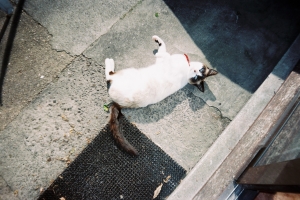 Late in life I have come to conclusions I really should have reached long ago. That’s very late in life – well, who knows? All I know for sure is that ‘time’s wingèd chariot’ grows more audible by the day.
Late in life I have come to conclusions I really should have reached long ago. That’s very late in life – well, who knows? All I know for sure is that ‘time’s wingèd chariot’ grows more audible by the day.
Anyway, one of the beneficial side-effects of having ‘fall’n into the sear, the yellow leaf’ has to be Lessons Learnt. Those kind of lessons – you know, difficult ones. The ones upon which I, having committed nearly every error possible to a person of probity and intelligence, am now an expert – albeit self-appointed (is there another kind?). Because with relocation in the offing, I need to make all the right moves I can. This’ll be the tenth removal in nine years. So I fondly hope it may be the last, and am trying to facilitate matters by investigating other people’s experiences. I am mining the collective for its wisdom. As it were (even the most cursory shufti at the collective’s track record for sagacity tends to induce nothing but hysteria). In practice, this includes looking around with varying levels of interest – and the odd rude snort – to observe what other people are getting away with doing.
Thus, the events at a certain location in my native land are proving as compelling and controversial to me as they clearly are to many of my countrymen – and the UN, no less (but we may safely ignore them. After all, we have done so before – and recently, at that).
I note with keen interest that Human Rights legislation is being invoked, and have accordingly looked that up. Well … coogoshlumme, but it could apply to me, me being human and all. Couldn’t it? If rights can only be rights if they are indivisible, it must therefore my right, too, to have a home. To have quiet enjoyment of same (ooh, I wish!). And to have my eccentricities and anti-social inclinations culture tolerated, enabling me to get on with life in my customary unobtrusive manner.
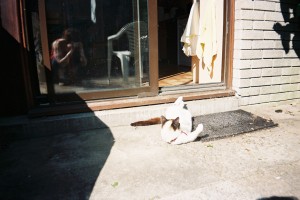 Now, if returning to my native land is an option (it may be), I might be able to settle happily in a tranquil spot. Tranquility is my main obsession: daytime disturbances combined with sleep-deprivation do not a happy bunny make. What I require is somewhere remote, but not too remote from civilisation, surrounded by woodland, green fields and the usual flora and fauna. And near water, although not at risk from floods and other waterborne nuisances.
Now, if returning to my native land is an option (it may be), I might be able to settle happily in a tranquil spot. Tranquility is my main obsession: daytime disturbances combined with sleep-deprivation do not a happy bunny make. What I require is somewhere remote, but not too remote from civilisation, surrounded by woodland, green fields and the usual flora and fauna. And near water, although not at risk from floods and other waterborne nuisances.
But how to achieve this return to normality (yes, truly: it is no accident that I owned a hard-won home in precisely such a location before disaster began a series of strikes)? First get back there and find a suitable greenbelt site. Then persuade the owner to flog it to me for a knock-down sum. Next I build my ‘willow cabin’ or dwelling of choice. Once the desres has been completed, I apply for retrospective planning permission. Which will be granted. Because otherwise there will be … ructions, with or – preferably – without blinkered bandwagon-hoppers or hypocritical thespians.
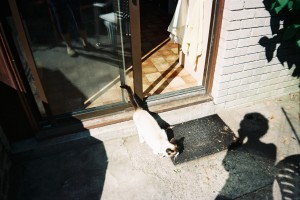 Here, fellow subjects/citizens, are my demands: a portion of a field close to woodland (where I can fossick for fuel); a habitable gaff, sustainably constructed; a herb/veggie plot so I may resume
Here, fellow subjects/citizens, are my demands: a portion of a field close to woodland (where I can fossick for fuel); a habitable gaff, sustainably constructed; a herb/veggie plot so I may resume slaughtering cultivating same after years in the concrete wilderness; ample statutory benefits so that I may fulfill my basic needs and fully enjoy my culture – so such items as rail-pass, free opera/theatre/exhibition tickets must be included in the package, together with a subsidy to cover the expenses of a cat from a rescue shelter (a pony would be nice; but I am not going to push my luck. Not in the early stages. Later on? Well, I just might …).
I would expect my neighbours to make some – minimal, of course, harhar! – sacrifices in order to ensure that my needs are met: an infinitesimally small price for them to pay for the undoubted and incalculable delights and educational opportunities provided by my presence in their midst. And they should be aware that any criticisms of the predilections forming my cultural hinterland will be dealt with severely. To the extent that the merest smidgeon of a sneer at my devotion to Shakespeare/Finzi/Paul Nash/the Epsom Derby or my approval of high church ritual/gay clergy/women bishops or for that matter any mockery of ‘cut glass’ tones will constitute a hate crime – you have been warned!
In return, I would not be over-using the health service – at least I would certainly do my best to avoid it by preventive means. I would be volunteering as usual, in the hope that some of my skills could be usefully deployed. I would not be using the schools. Nor the roads; not too much, for I would do what I’ve been used to doing for more than 30 years: I’d get on my bike.
And I would continue, as ever, to pay my taxes.
Home – a fixed abode of exactly the kind I want, where I want and at the lowest possible cost: what a lovely thought!
Not going to happen though, is it?
When’s the next chariot due for take-off?
Copyright © Minnie at Les Minimes (minniebeaniste) 2009-2011. This content is for personal, non-commercial use only. The use of this content feed on other websites breaches copyright.
Bang to rights
Like everybody else I’ve been watching London then other cities in England being attacked by hordes of criminals. Seeing the lunatics not only apparently taking over the asylum but also being allowed to get away with it, again like everybody else I’ve been racking my brain for reasons. I am not qualified to make an informed analysis, besides it is too soon. Although it should now be obvious that the proposed cuts to the police force must not go ahead. Potentially, these spell ‘suicide’ for our country, especially for the law-abiding majority, many of whom have seen their lives changed forever by shock, fear or loss due to wanton destruction.
And two further observations may be made. Firstly, the damage done to England’s reputation abroad, notably among investors (otherwise known as job-creators or employers), cannot be over-estimated given that it is liable to add further damage to an already weakened economy. What price the 2012 Olympics now, not to mention the vitally important tourism industry? As for local/regional economic damage, it is already far in excess of burned cars and buildings: confidence at home and abroad is all – in any market, as it is in any individual life. Secondly, what has been happening has nothing to do with race, ethnicity, religious affiliation or even class. It is about criminality, based on moral vacuity, opportunism and a society that has succeeded only in teaching its younger members that you are what you have. And what you want, you must grab – by any means. Nothing and – crucially – nobody else matters.
Such an attitude was well-entrenched throughout the social strata all over the place long before I left my native land: you are what you have materially, and that is all you are, is almost axiomatic. Fine, it’s a free country: if you want to think like that (ie if you’re enough of a blinkered berk to do so), then, er, do so. But be aware that, if you do, then this insidiously powerful prejudice will filter down from you (in your elevated position) and, like Chinese Whispers, be perverted, twisted and – irony of ironies – probably used against you. Crudely speaking, as far as rampant consumerism goes beware of what you wish for – if you get it, others will surely want to take it from you. This may even include your life.
My heart goes out to the families and friends of Haroon Jahan, Shahzad Ali and Abdul Musavir. Tariq Jahan‘s dignity and nobility, his sentiments shared by the group of Sikh and Muslim mourners in Birmingham, are unforgettable. England cannot afford to lose such people; it is the government’s duty to protect them. My sympathies are also with those who’ve lost homes and/or livelihoods. I know what that’s like. And I also know what it is like to lose these things due to other people’s ignorance and greed. Such things do violence to us all. So I also know what it is like to feel angry, powerless, frustrated – years devoted
to fruitless job-hunting? Yup, been there. But channelling this despair into robbery, assault and battery? No. Never. Not even in my wildest dreams or nightmares would it even occur to me – any more than it would to most people in England.
The answers? I wish I knew (I’m a UK taxpayer). More authority? More people obviously need to understand that respect has to be earned, keeping it demands constant effort – and that rights entail responsibilities. Police powers, especially in London, have been reduced – notably since the creepily Newspeak-style change in nomenclature from ‘the Force’ to ‘the Service’. Services only protect people if they’re armed (which might explain partially why I feel more secure in France than I did in England: les forces de l’ordre here are armed to the teeth and those who don’t, er, respect them certainly fear ’em. Aside from a higher police:members of the public ratio than in the UK, we also have more than 13,000 CRS* plus 17,300 of les jaunes** to deal with riots). England and Wales are further handicapped by a soggy criminal justice system and what must be, judging by the results, some of the slackest parenting in the world. All of these combine with near-powerless frontline policing to produce what the world has now witnessed. Some have viewed it all with horror, others with grim satisfaction; more with either hand-wringing or anger – each of the latter sub-groups being quick to blame the other.
But if any of the knee-jerk sneerers, jeerers and blamers out there would care to engage their brains with the real challenges facing us, then they can do no better than to check out a pair of blogs. They’re both written by people who try to tackle both root causes and results. One is a police officer – and published author – who is a former soldier. The other is a youth worker and winner of last year’s Orwell Prize.
I thank them, I applaud them, and I wish all those in frontline services well – and, above all, safe. And my thoughts and prayers are with anybody in my country who has suffered due to the vicious stupidity of the few. Now, for a taste of what the majority of English people are like, here are alternative views of how they behave in a crisis.
These people deserve better. So the government must demonstrate beyond doubt they are on the side of of the law-abiding people of England, whose right to quietly live and work in their neighbourhoods, towns and cities has been so shamefully ignored, and for so long. They are the real victims in this, and that must never be forgotten.
Stop press: 15/08/’11 – I took a special interest in what happened in Ealing last week. I lived there before coming to France, and very quickly grew to love it thanks to the variety and charm of people and place. I was horrified to see it under attack, and outraged by the senseless murder of Richard Mannington Bowes. Eugénie has just kindly sent me this heartening report. The level of positive response doesn’t surprise me one bit.
* Compagnies Républicaines de Sécurité, anti-riot (principally; they have other functions) brigades of la Police Nationale ** = slang term for la Gendarmerie Mobile, anti-riot division of the Gendarmerie (itself a military organisation)
Pix sourced from Commons Wiki.
Copyright © Minnie at Les Minimes (minniebeaniste) 2009-2011. This content is for personal, non-commercial use only. The use of this content feed on other websites breaches copyright.
Scream
In his diary entry of 22.01.1893 (written in Nice), Edvard Munch described the emotional genesis of his most famous painting, Der Schrei der Natur (commonly known as The Scream):
I was walking along a path with two friends – the sun was setting – suddenly the sky turned blood red – I paused, feeling exhausted, and leaned on the fence – there was blood and tongues of fire above the blue-black fjord and the city – my friends walked on, and I stood there trembling with anxiety – and I sensed an infinite scream through nature.
Here his words are set to music and hauntingly sung by celebrated Norwegian singer, Kari Bremnes.
Inadequately, I add to these powerful artistic testimonials my thoughts and prayers for, to and with the people of Norway.
Welcome home, Hervé et Stéphane!
Hooray, hooray, hooray, oh joy! Good news: wonderful, isn’t it? Latest reports I’ve seen say they’re expected back in France tomorrow am.

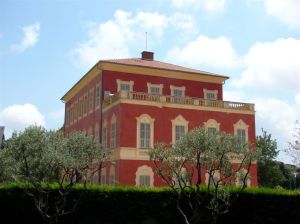

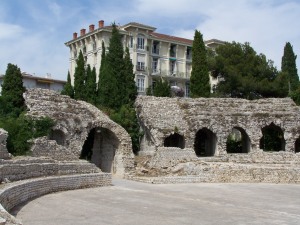


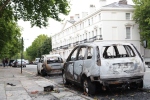





 <
<
